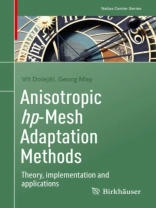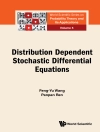Mesh adaptation methods can have a profound impact on the numerical solution of partial differential equations. If devised and implemented properly, adaptation significantly reduces the size of the algebraic systems resulting from the discretization, while ensuring that applicable error tolerances are met. In this monograph, drawing from many years of experience, the authors give a comprehensive presentation of metric-based anisotropic
hp-mesh adaptation methods.
A large part of this monograph is devoted to the derivation of computable interpolation error estimates on simplicial meshes, which take into account the geometry of mesh elements as well as the anisotropic features of the interpolated function. These estimates are then used for the optimization of corresponding finite element spaces in a variety of settings. Both steady and time dependent problems are treated, as well as goal-oriented adaptation. Practical aspects of implementation are also explored, including several algorithms. Many numerical experiments using the discontinuous Galerkin method are presented to illustrate the performance of the adaptive techniques.
This monograph is intended for scientists and researchers, including doctoral and master-level students. Portions of the text can also be used as study material for advanced university lectures concerning a posteriori error analysis and mesh adaptation.
Table of Content
Introduction.- Metric Based Mesh Representation.- Interpolation Error Estimates for Two Dimensions.- Interpolation Error Estimates for Three Dimensions.- Anisotropic Mesh Adaptation,
h-Variant.- Anisotropic Mesh Adaptation Method,
hp-Variant.- Framework of the Goal-Oriented Error Estimates.- Goal-Oriented Anisotropic Mesh Adaptation.- Implementation Aspects.- Applications.












